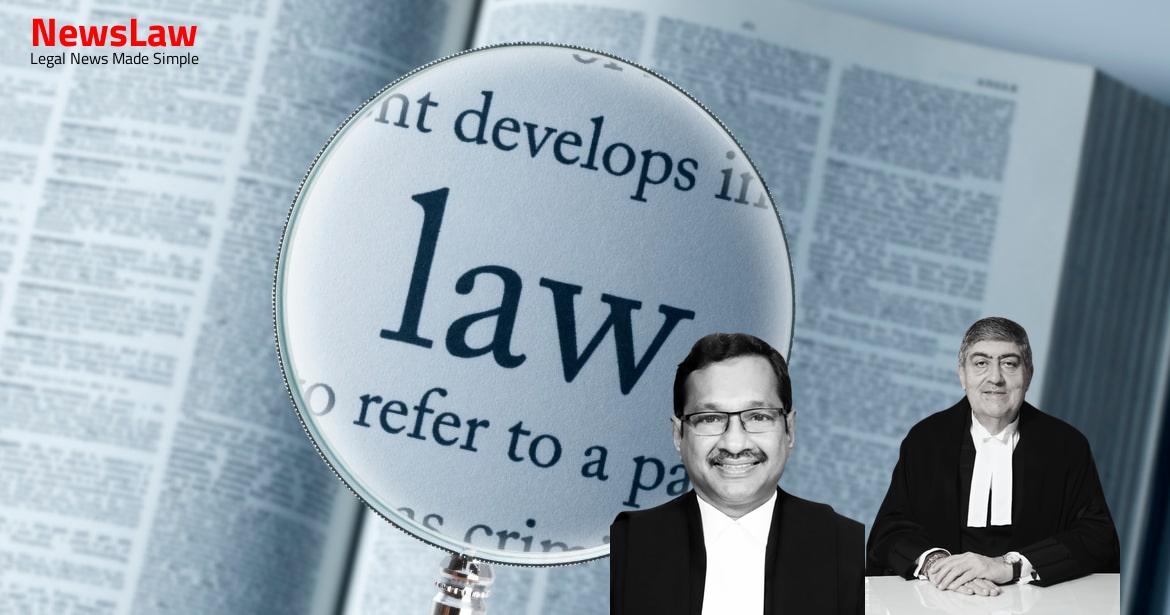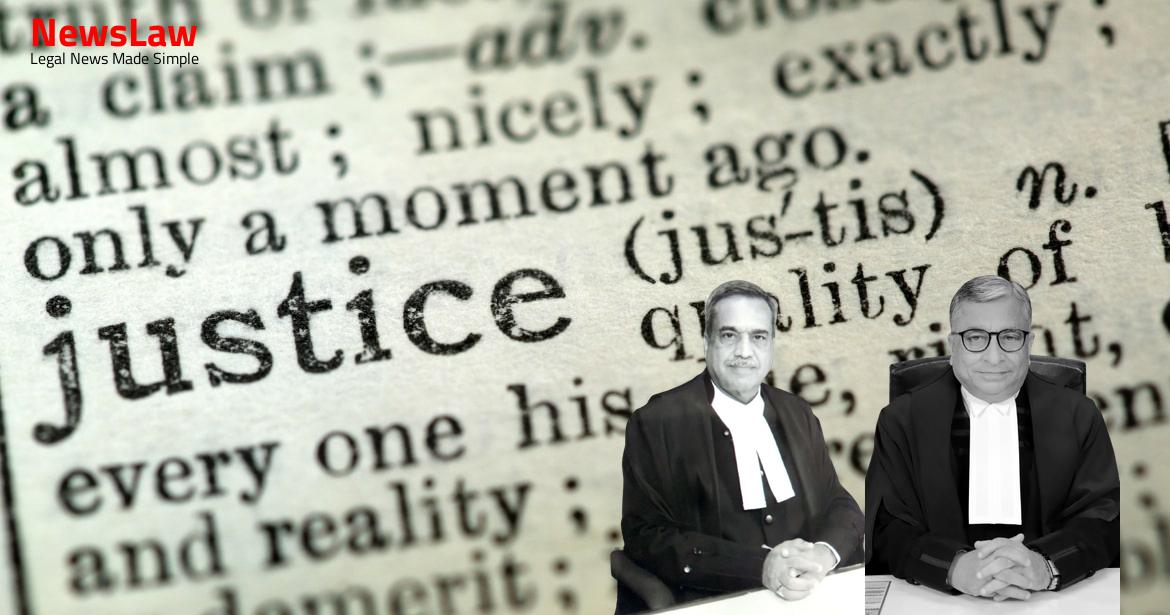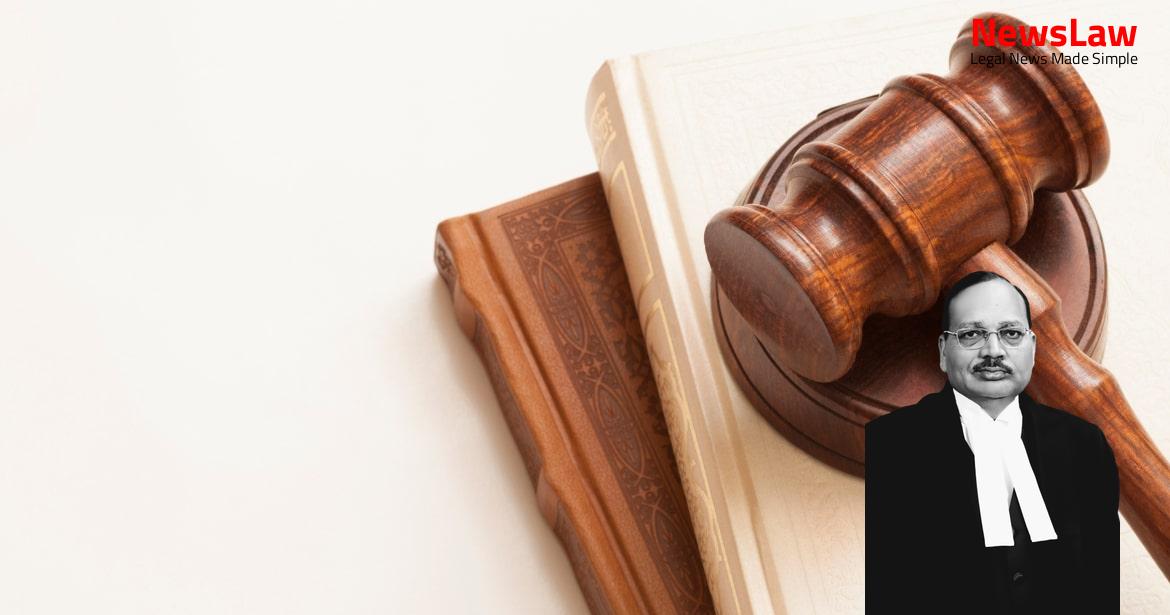Explore a recent court case where the appellant was exonerated due to the lack of prosecutable evidence in a PMLA case. The Court’s decision highlighted the necessity of establishing clear links between the seized property and proceeds of crime, questioning the legal basis for the attachment. Stay tuned to understand the significance of evidence in legal proceedings like this.
Facts
- The High Court dismissed the petition filed by the appellant seeking quashment of proceedings related to the PMLA case.
- The High Court held that the commission of a scheduled offence is a fundamental pre-condition for initiating proceedings.
- The offence of money laundering under PMLA is independent of the scheduled offence as it deals with activities related to proceeds of crime.
- The High Court rejected the appellant’s argument that the closure report by CBI in the scheduled offence case should be relied upon due to seizure of new currency notes.
- The High Court emphasized that observations in a bail application without connecting to any offence are not sufficient to quash proceedings.
- The Enforcement Directorate registered an offence under PMLA in addition to the scheduled offences based on findings from the CBI’s FIR.
- The CBI registered multiple FIRs against the appellant, including one for offenses under IPC and PC Act.
- The appellant deposited a significant amount of money in the firm’s bank accounts and faced search and seizure by the IT Department resulting in the discovery of currency and gold.
- The CBI submitted a closure report in the main case against the appellant due to lack of sufficient evidence.
- Deputy Director passed provisional attachment order under PMLA.
- Adjudicating Authority refused to confirm the attachment order.
- I.T. Department provided details of seizure made from the appellant.
- Investigation by I.T. Department based on search is closed.
- Lack of identification of bank officers converting old currency to new.
- Allegation of conversion through bank officers deemed speculative.
- Tax details for Financial Year 2016-17 satisfied Authority on seized money.
- New currency seized belonged to M/s SRS Mining.
- Currency proceeds were from sand sales by M/s SRS Mining.
- Description of bank or bank officers involved not on record.
Also Read: Judicial Scrutiny of Bidding Process and Contractual Obligations
Arguments
- Learned senior counsel for the petitioner argued that the invocation of PMLA requires a pre-existing occurrence of the scheduled offence as the proceeds of crime are derived from criminal activity of the said offence.
- It was contended that under Section 8(1) of PMLA, a show cause notice can be issued if the Authority believes that a person has committed an offence under Section 3 or is in possession of proceeds of crime.
- Citing judgments in Radheshyam Kejriwal Vs. State of West Bengal and Ashoo Surendranath Tewari vs Deputy Superintendent of Police, EOW, CBI and Another, it was argued that the Adjudicating Authority should have considered the evidence before refusing to pass an order for attachment.
- Based on the material available, it was found that the offence of money laundering specified in PMLA is not made out in this case.
- The adjudication proceedings and criminal proceedings are independent, but evidence collected in the criminal proceedings can be a relevant factor in PMLA cases when the Authority is unable to attach the property due to lack of evidence.
- ASG is not in a position to controvert the arguments on merits by the senior counsel for the appellant.
- Order of the Adjudicating Authority and its findings are deemed insufficient to quash the proceedings.
- The order passed by the Adjudicating Authority under Section 5(5) PMLA is appealable and pending before the Appellate Authority.
Analysis
- The Deputy Director’s reasonable belief is not based on any specific material, only on speculation and conjecture.
- No bank officials are identified or named in the record, raising doubts on the allegations.
- The adjudication proceedings’ findings of no contravention of the Act should prevent trial as an abuse of court process.
- The court should ensure allegations are proven beyond reasonable doubt.
- Closure of the case recommended due to lack of prosecutable evidence.
- Deputy Director did not investigate the aspect concerning banks or bank officers.
- The court cannot proceed without substantial evidence, regardless of the probabilities.
- Judgment of Radheshyam Kejriwal case suggests exoneration on merit leads to closure of criminal prosecution.
- Allegations not substantiated with prosecutable evidence; exoneration based on lack of evidence.
- Failure to identify banks or bank officers discredits the entire reasonable belief.
- Legal tenability of the reasonable belief is questioned due to lack of basic material.
- Attaching entire seized amount without clear basis for the attachment vitiates the reasonable belief.
- Property seized must be linked to proceeds of crime as per PMLA definition to be relevant.
- The Court relied on the judgment of Radheyshyam Kejriwal and set aside the High Court’s decision in the case of Ashoo Surendranath Tewari.
- Exonerated the appellants due to the bleak chance of conviction in the same facts.
- Analysed the report of the I.T. Department and the reasoning given by the CBI in the final closure report RC MA1 2016 A0040.
- Considered the order passed by the Adjudicating Authority in reaching the final conclusion.
- High Court findings not sustained due to lack of consideration of relevant material
- Appellant is considered innocent until allegations are proven
- Chances to prove allegations in Court are bleak based on precedent judgments
- Chances of proving allegations in the Court are very bleak
Decision
- ECR CEZO 19/2016 and Complaint No. 2 of 2017 quashed
- Impugned order passed by the High Court set aside
- Appeal allowed
Case Title: J. SEKAR @ SEKAR REDDY Vs. DIRECTORATE OF ENFORCEMENT (2022 INSC 519)
Case Number: Crl.A. No.-000738-000738 / 2022



